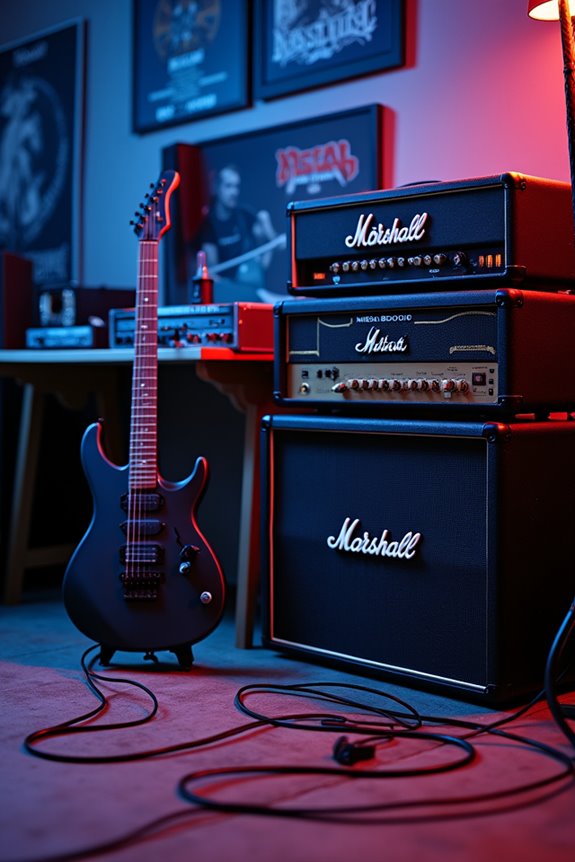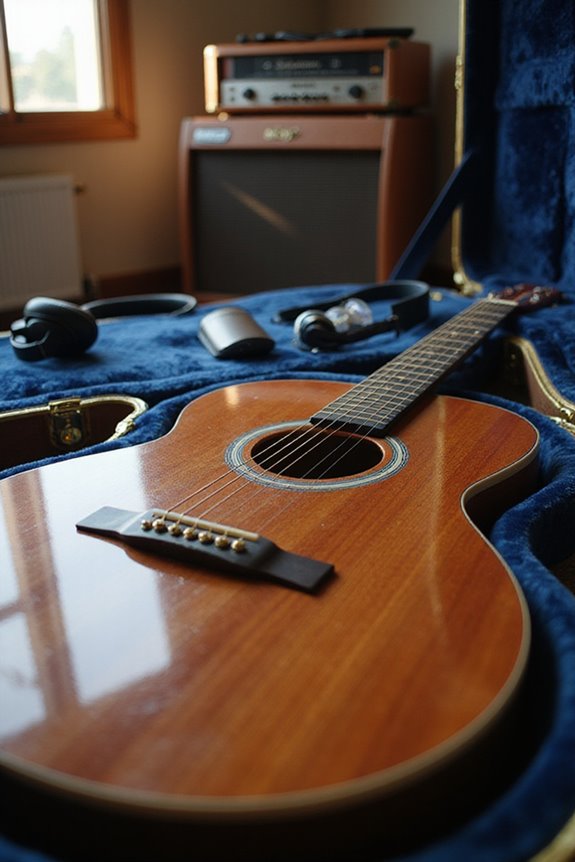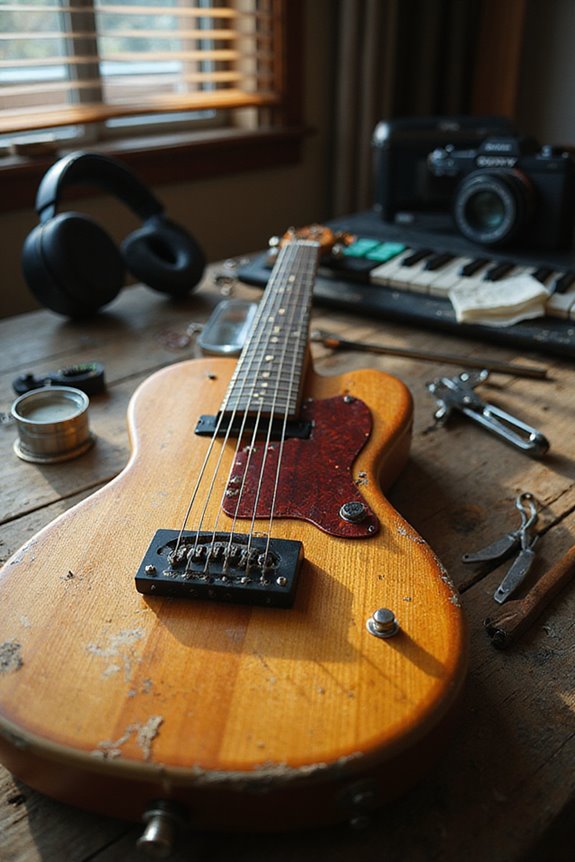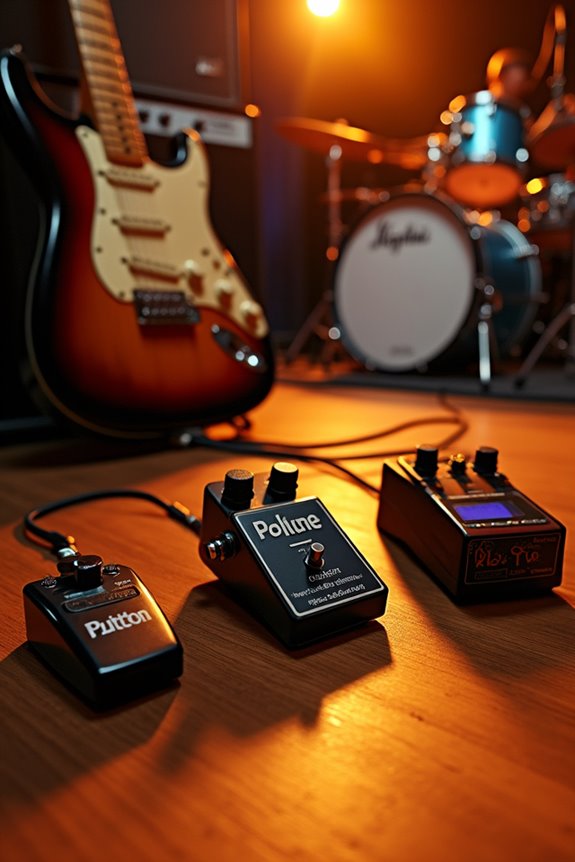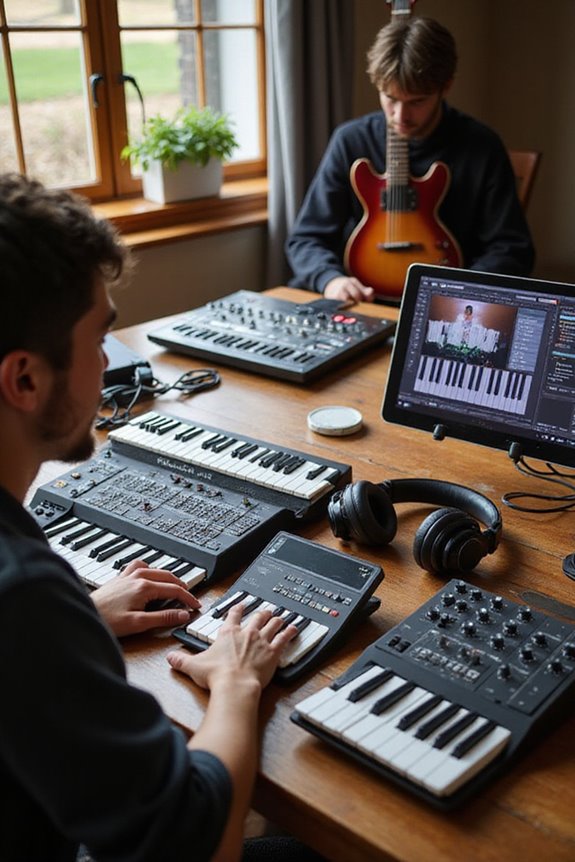When we’re choosing the best guitar amplifiers for metal, we’ve got to take into account tone and gain. Tube amps like the Bugera V5 Infinium offer rich overdrive. Solid-state options, like the Roland JC-120, provide durability and great distortion. For those after versatility, combo amps like the EVH 5150III are popular. Practice amps, like the Fender Mustang LT 25, balance portability and features well. Want to guarantee you pick the perfect amp for your style? There’s more to explore.
Key Takeaways
- Tube amps, like the Bugera V5 Infinium, offer rich, warm tones ideal for achieving aggressive metal sounds.
- Solid-state amps, such as the Roland JC-120, provide high-gain capabilities and durability for metal guitarists.
- Combo amps, like the EVH 5150III, deliver powerful harmonic overdrive and dynamic input sensitivity suited for metal.
- Practice amps, such as the Fender Mustang LT 25, are portable and feature built-in effects for creative practice sessions.
- Look for features like high-gain capabilities, tone shaping controls, and dedicated FX loops to enhance your metal sound.
Tube Amps for Metal
When we plunge into the world of tube amps for metal, it’s essential to recognize their unique charm and power. Tube amp advantages include their ability to produce rich, warm tones that perfectly complement metal’s aggressive sound. For instance, the Bugera V5 Infinium offers controlled tube overdrive, ideal for beginners wanting to experiment with metal tone characteristics. Meanwhile, the Monoprice 15-Watt Tube Amp provides versatile clean and overdrive channels, making it perfect for switching between styles. The Blackstar HT-5R, compact and powerful, delivers classic and modern metal tones, while the Orange Micro Dark proves that even low-budget options can produce massive sound. Ultimately, tube amps elevate our playing, providing the depth and clarity metal demands.
Solid-State and Modeling Amps for Metal
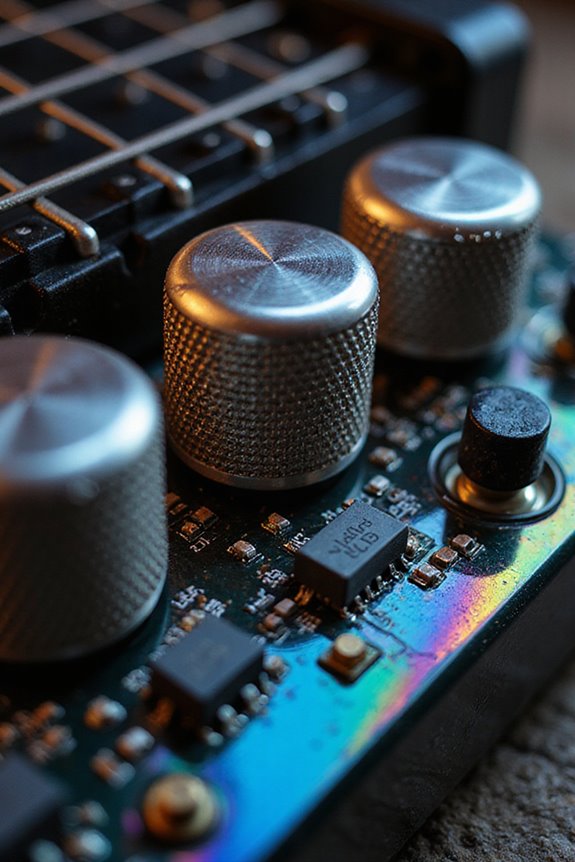
Solid-state and modeling amps have carved out a significant niche in the metal genre, and we’re here to explore how they bring practicality and power to our playing.
Solid-state advantages include their durability and high-gain capabilities, making them suitable for aggressive metal tones. For instance, the Roland JC-120 and Marshall MG30GFX deliver impressive distortion while remaining reliable for gigging musicians.
On the other hand, modeling amps like the Fender Mustang Series offer unparalleled modeling flexibility, allowing us to switch between various high-gain sounds effortlessly. With onboard presets tailored for different metal subgenres, we can easily customize our tone.
Ultimately, both solid-state and modeling options provide versatile, powerful solutions for metal guitarists seeking quality without breaking the bank.
Combo Amps for Metal
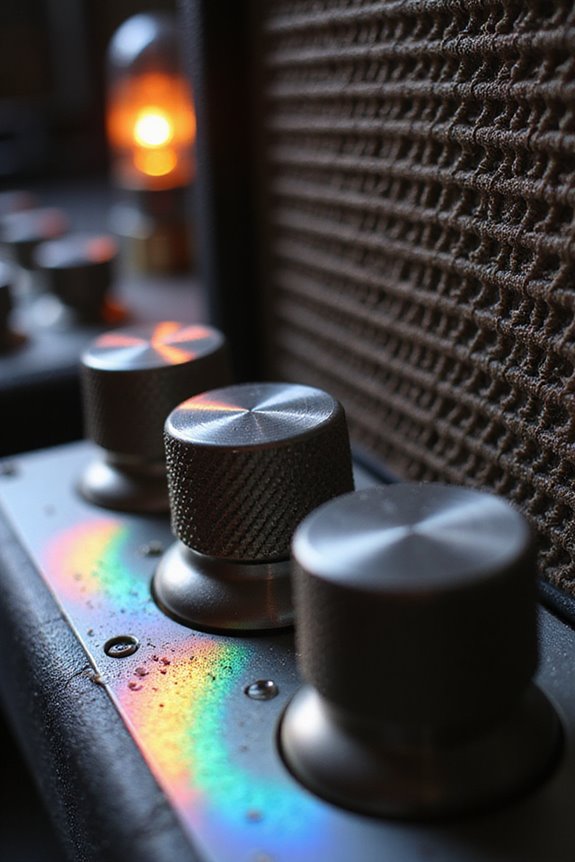
As we explore the domain of combo amps for metal, we find that these versatile units offer a compelling solution for guitarists looking to achieve powerful tones in a manageable package. Combo amp features like high wattage outputs, multiple gain stages, and built-in effects make them ideal for metal. For instance, the BOSS Katana-100 Gen 3 delivers lush high-gain tones, while the EVH 5150III Iconic Series is revered for its iconic metal sounds. These amps provide rich harmonic overdrive and dynamic input sensitivity, enhancing our riffs and solos. However, we should note some models lack power scaling, which might limit home practice. Overall, combo amps deliver the punchy, aggressive metal tone characteristics we crave, making them a worthy choice for any metal guitarist.
Practice Amps for Metal
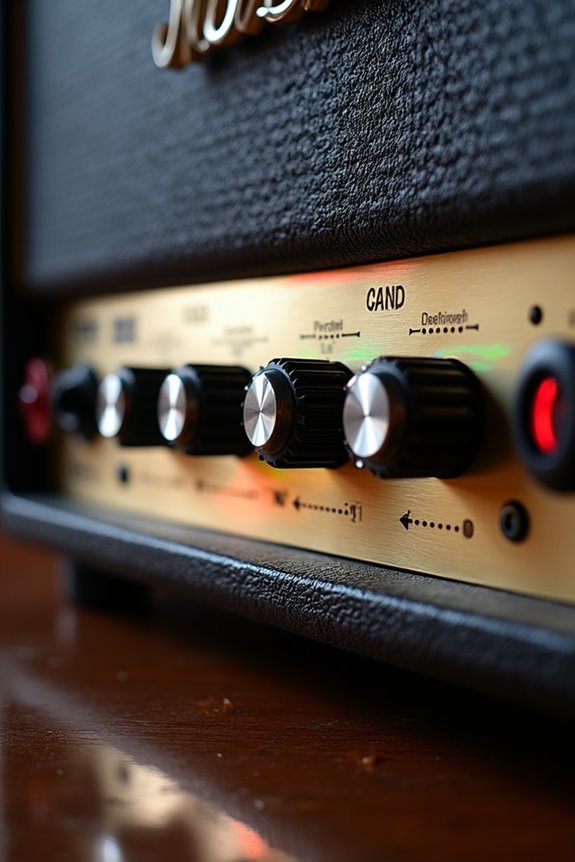
Finding the right practice amp for metal can be a game changer, especially since these smaller units can deliver impressive tones without overwhelming volume. Amps in the 10 to 30-watt range, like the Fender Mustang LT 25, are ideal for balancing practice and recording needs. For silent practice, many of us appreciate models with headphone outputs, allowing us to immerse ourselves in high-gain tones without disturbing anyone. Amp portability is key, too; units such as the Mustang LT 25 weigh around 14.9 lbs, making them easy to transport. With built-in effects and versatile amp models, these practice amps not only support our daily practice but also inspire creativity, all while keeping our sound in check.
Features to Look for in Metal Amps
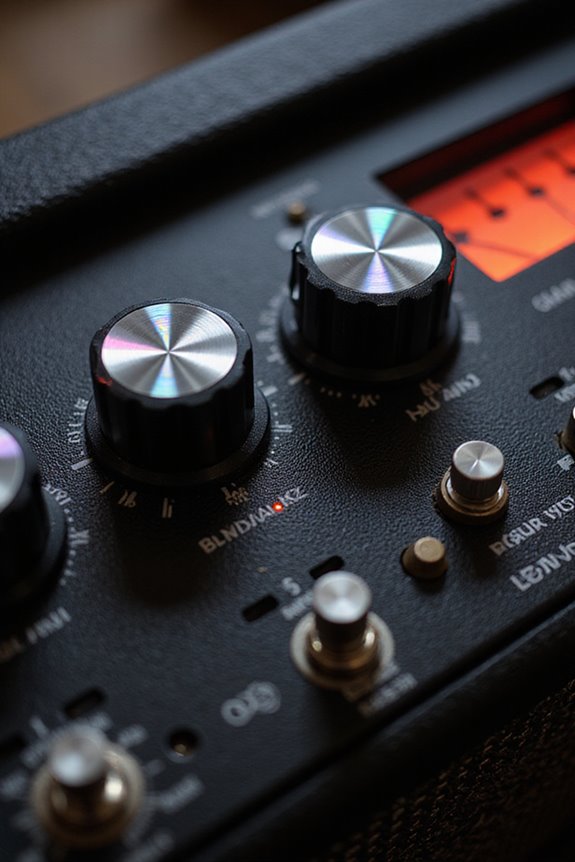
When we step up from practice amps to full-fledged metal amplifiers, understanding the features that enhance our sound becomes vital. A key aspect is tone shaping; we want multiple channels with independent gain controls to achieve versatile tones for various metal styles. High-gain capabilities are essential for that tight distortion we crave, while tone controls like Bass, Middle, and Treble let us sculpt our ideal sound. Impedance settings also play a significant role, allowing us to match our amp with different cabinets for best projection. Additionally, features like a dedicated FX loop help maintain signal clarity when using effects, ensuring our metal sound remains powerful and dynamic, regardless of the performance environment. Moreover, speaker size can significantly influence the tone and bass response, making it crucial to choose the right configuration for your metal genre.
Notable Amps and Artists in Metal
In the domain of metal, the right amplifier can significantly shape our sound and elevate our performance. Iconic amplifiers like the Peavey 5150, crafted by Eddie Van Halen, have defined the tone for bands such as Machine Head and Killswitch Engage. The Marshall JCM800, synonymous with legendary guitarists like Slayer’s Kerry King, has also left a lasting impact on thrash metal. Another staple, the Mesa/Boogie Dual Rectifier, is celebrated for its aggressive sound and versatility, making it a favorite among many artists. Additionally, boutique brands like Bogner and Diezel are gaining traction, with Jerry Cantrell of Alice in Chains utilizing their unique tones. These amplifiers not only complement our playing but also embody the essence of metal music.
Choosing the Right Amp for Your Metal Style
How do we choose the right amplifier to match our unique metal style? First, we need to take into account our tonal preferences. For thick distortion and articulate clarity, a tube amp might be ideal, providing that warm, harmonically rich sound. However, if we’re looking for consistency and durability, solid-state or modeling amps can deliver powerful, high-gain tones without volume concerns.
Next, we should reflect on wattage. Lower wattage amps are great for home practice, while medium to high wattage models shine during live performances.
Finally, don’t forget about amp maintenance and tone adjustments. Regular maintenance guarantees our amp delivers peak performance, while tone shaping controls allow us to dial in the aggressive mids and tight lows that define our metal sound.
Frequently Asked Questions
How Do I Maintain My Metal Guitar Amp?
Did you know that regular amp cleaning can extend its lifespan by up to 30%? We should also prioritize cable maintenance to avoid noise issues. Together, we can keep our gear in top shape for all sessions!
Can I Use a Bass Amp for Metal Guitar?
Absolutely, we can use a bass amp for metal guitar! Its bass amp characteristics can enhance our metal guitar tones, but we should watch for muddiness and adjust our EQ to achieve the best sound.
What Speakers Are Best for Metal Guitar Amps?
When we’re considering the best guitar speaker brands for metal, speaker wattage is essential. We should look for models like Celestion Vintage 30 and G12H75 Creamback to achieve that powerful, aggressive tone we crave in our sound.
How Does Tube Vs Solid-State Affect Tone?
Imagine two musicians: one with a warm, expressive melody (tube characteristics), the other with a steady, reliable beat (solid-state advantages). Each offers unique tones and dynamics, shaping our sound experience in distinct, enchanting ways.
Are There Amp Simulators for Recording Metal Guitar?
Yes, there are great amp simulators for recording metal guitar. With digital recording, we can use amp modeling to achieve powerful tones. Tools like Neural DSP and Line 6 Helix really help us capture that authentic sound.

